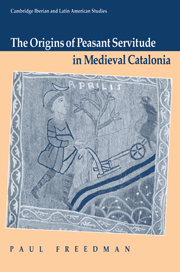Book contents
- Frontmatter
- Contents
- List of tables
- Preface
- List of abbreviations
- Map 1 Densities of Remença households at the end of the Civil War
- Map 2 Catalan comarcas and principal towns
- Map 3 Pyrenees and pre-Pyrenees
- 1 Introduction: medieval serfdom and Catalonia
- 2 Enduring characteristics of rural Catalonia
- 3 The free peasants of the ninth to eleventh centuries
- 4 Changes in the status of peasants: late twelfth and early thirteenth centuries
- 5 Catalan servitude in the thirteenth century
- 6 Effects of the Black Death
- 7 Peasant agitation and civil war, 1388–1486
- Conclusion: origins of Catalan servitude
- Appendix 1
- Appendix 2
- Appendix 3
- Appendix 4
- Bibliography
- Index
5 - Catalan servitude in the thirteenth century
Published online by Cambridge University Press: 06 January 2010
- Frontmatter
- Contents
- List of tables
- Preface
- List of abbreviations
- Map 1 Densities of Remença households at the end of the Civil War
- Map 2 Catalan comarcas and principal towns
- Map 3 Pyrenees and pre-Pyrenees
- 1 Introduction: medieval serfdom and Catalonia
- 2 Enduring characteristics of rural Catalonia
- 3 The free peasants of the ninth to eleventh centuries
- 4 Changes in the status of peasants: late twelfth and early thirteenth centuries
- 5 Catalan servitude in the thirteenth century
- 6 Effects of the Black Death
- 7 Peasant agitation and civil war, 1388–1486
- Conclusion: origins of Catalan servitude
- Appendix 1
- Appendix 2
- Appendix 3
- Appendix 4
- Bibliography
- Index
Summary
In 1283 the parliamentary assembly meeting in Barcelona enacted a law requiring unfree tenants to pay redemption fines if they left seigneurial lands to settle on royal estates. The law enshrined what had already been included in charters of recognition and commendation: the obligation to pay redemption fines in order to depart, and a waiver of the right of refuge offered by the king or by cities (which were considered under royal jurisdiction). The legislation of 1283 is commonly referred to by its opening lines in Catalan, “En les terres o llocs.” It established a basic law of servitude in the following respects: (1) by distinguishing lands in which redemption was customary from those where it was not required; (2) by identifying redemption as the key component of servile tenure; and (3) by limiting, as a matter of public law, the rights of refuge afforded by free territories. Much of the subsequent body of legal opinion concerning Remences would take the form of glosses to this constitution of the Corts of 1283.
It has already been shown that the redemption payment was well-established early in the thirteenth century and that other seigneurial rights were in place considerably before 1283. This chapter examines the workings of servile institutions and the significance of status in the period between 1202 and 1283: between the Corts of Cervera (allowing seigneurial mistreatment) and the Corts of Barcelona.
One can hardly speak of an elaborate system of peasant servitude for this period.
- Type
- Chapter
- Information
- The Origins of Peasant Servitude in Medieval Catalonia , pp. 119 - 153Publisher: Cambridge University PressPrint publication year: 1991



